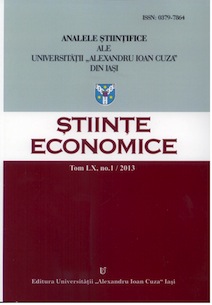The impact of government expenditures upon economic growth in post-communist countries
The impact of government expenditures upon economic growth in post-communist countries
Author(s): Marius Sorin Dincă, Gheorghita DincaSubject(s): Economic policy, Economic development, Transformation Period (1990 - 2010), Present Times (2010 - today)
Published by: Editura Universităţii »Alexandru Ioan Cuza« din Iaşi
Keywords: economic growth; government expenditures; linear regression; sustainability of economic growth;
Summary/Abstract: This paper examines the relationship between the structure and share of government expenditure into Gross Domestic Product (GDP) and the real GDP per capita. Our study uses a micro panel data for a sample made of ten countries from Central and East European, for the period 2002-2012. The empirical results of the linear regression show that the GDP/capita is positively correlated with public order and safety expenditures as well as with economic actions, while national defense and general public services are negatively correlated. The results obtained largely correspond with the ones reached by other researchers approaching the topic of the relationship between economic growth and composition of the government expenditures. The health and education expenses, though instrumental for the long-term development of any society, did not show any significant impact upon the evolution of the GDP/capita, probably as a result of the short-term available data.
Journal: Analele Ştiinţifice ale Universităţii »Alexandru Ioan Cuza« din Iaşi. Ştiinţe economice
- Issue Year: 60/2013
- Issue No: 1
- Page Range: 83-92
- Page Count: 10
- Language: English

